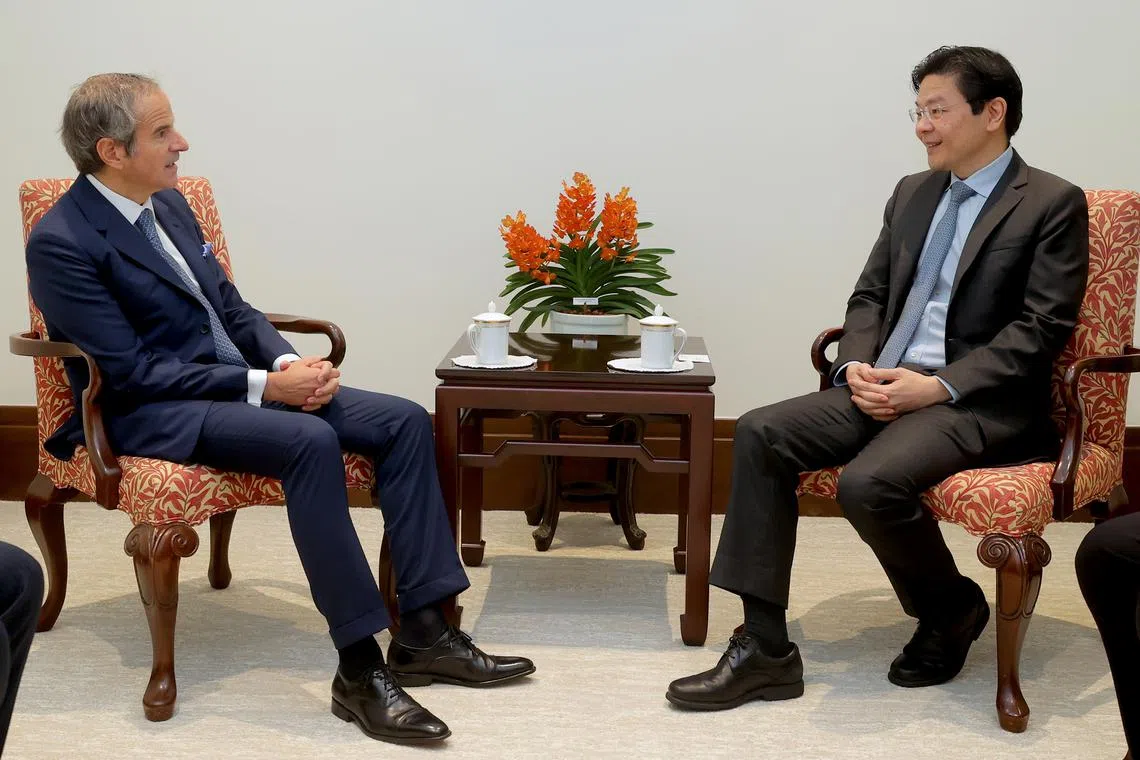S’pore could have nuclear energy ‘within a few years’, if it decides on it: UN nuclear watchdog chief
Sign up now: Get ST's newsletters delivered to your inbox

Mr Rafael Mariano Grossi, director-general of the International Atomic Energy Agency, at a public lecture on developments in atomic energy and nuclear security at NUS on July 25.
ST PHOTOS: NG SOR LUAN
SINGAPORE – Should Singapore decide in future to adopt nuclear energy, the country could tap the energy source “within a few years” from that point, said the UN nuclear watchdog chief on July 25.
International Atomic Energy Agency (IAEA) director-general Rafael Grossi said small modular advanced reactors are one option for the island state.
Singapore could also potentially develop a plant in collaboration with another country in Asean, he added.
Small modular reactors are advanced and compact reactors that can be factory-assembled and installed in dense urban areas. They are also known to be safer than traditional large reactors, but are now mainly still in a research phase.
Mr Grossi was responding to a question on what advice he has for city states considering tapping nuclear energy, after delivering a lecture on developments in atomic energy and nuclear security at NUS. “Singapore does well in looking into nuclear energy, and my personal impression is that within a few years, you will see your first nuclear power plant... and perhaps in combination or cooperation with your Asean neighbours,” said Mr Grossi.
He pointed to a successful joint venture nuclear plant between Slovenia and Croatia, set up in Slovenia. Both countries were previously republics within Yugoslavia. The Krsko power plant, a traditional reactor, provides for a quarter of Slovenia’s electricity needs and 16 per cent of Croatia’s.
Mr Grossi is in Singapore as part of the S R Nathan Fellowship, a high-level programme for foreign leaders and prominent individuals to visit the country.
During his one-day visit to Singapore, Mr Grossi met President Tharman Shanmugaratnam and Prime Minister Lawrence Wong.
He also met Minister for Manpower and Minister-in-charge of Energy and Science and Technology Tan See Leng and Minister for Sustainability and the Environment Grace Fu.
“The fact that I’m here is not only because I’m a friend of Singapore and I like to be here. It is because here there’s something very promising going on,” Mr Grossi told an audience of 250 junior college and university students, academics, industry experts and government officials at the Shaw Foundation Alumni House in NUS.
“This country is growing. This country is very strong in tech. This country needs more energy, and of course it needs to do it in a way that is compatible with its own policies, in terms of gradually decarbonising its energy mix,” he added.
PM Wong, who is also Finance Minister, had in his Budget speech in February said that Singapore would study the potential deployment of nuclear power here. The Republic has not made a decision yet on whether it will tap nuclear energy.
During his lecture, Mr Grossi also noted that Asean countries have shown an increasing interest in collaborating with the IAEA on developing nuclear energy capabilities. Areas of interest for the bloc include workforce development, nuclear technology, and regulatory frameworks.
The UN nuclear body has a method to assist countries that are considering or planning their first nuclear power plant. The IAEA also guides them in the process, from the decision-making to the final investment and construction.
Mr Grossi cited how countries like Indonesia and Vietnam are planning to have nuclear power plants by the mid-2030s, while in other countries, companies are already signing agreements to start looking into concrete projects.
Asean’s interest in nuclear energy mirrors that of other countries, as more come to view atomic power as a stable, carbon-free alternative to fossil fuels.
The IAEA chief also said that it made sense for Singapore to consider tapping nuclear energy, as the island state has limited access to renewable energy options.
Around 95 per cent of the country’s energy supply comes from burning natural gas, a fossil fuel.
But given the rising energy demand, and the need to reduce emissions from the power sector, Singapore needs a stable domestic source of energy, he added.
“When it comes to decarbonising, what are your options? Here, there is no hydropower. You have renewables, but you don’t have much territory... It’s a small country, so you cannot have wind parks for kilometres on end.
“In my opinion... Singapore could rightly (be) the most perfect example of a country that needs nuclear energy. With a very small nuclear power plant, you can have a level of energy density and production that you cannot match with anything else,” he said.
He added that Singapore has the technological capacity, financial ability and regulatory institutions in place to deploy nuclear energy if it so decides.

Prime Minister Lawrence Wong (right) meeting Mr Rafael Mariano Grossi on July 25.
PHOTO: MDDI
Mr Grossi was also asked if the rising geopolitical tensions in the region, such as the ongoing border clashes between Thailand and Cambodia, could affect the region’s nuclear energy ambitions.
He said: “Unfortunately, we live in a world that is increasingly fragmented and with tensions. But we have a number of very positive developments in energy, in industry, in infrastructure all over the world.
“So the fact that we have conflict does not affect the reality that our economies continue moving, and nuclear power is part of that.”
In a Facebook post on July 25, PM Wong said of his meeting with Mr Grossi: “As we explore our options for low carbon energy, we will continue working with the IAEA to build our capabilities and uphold strong safety standards.”
He added that government agencies contribute to several technical committees within the IAEA and have benefited from the organisation’s expertise in nuclear medicine, imaging and oncology.
During his visit, Mr Grossi and Ms Fu renewed an existing partnership that allows both the UN atomic body and Singapore to continue training countries on matters related to nuclear science and technology, and their peaceful use.
Under this Third Country Training Programme, over 140 participants from 27 countries have been trained through 17 fellowships and seven talent-building programmes since 2015, said the Ministry of Sustainability and the Environment in a statement.
These included both workshops and longer-term programmes, covering topics such as nuclear medicine, nuclear law, food safety and pest control.
Under the renewed agreement, Singapore will develop training programmes for countries in areas such as human health, industrial radiography and environmental radioactivity monitoring.



